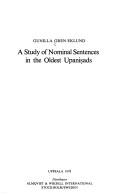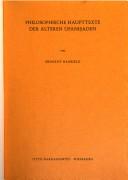| Listing 1 - 7 of 7 |
Sort by
|
Book
ISSN: 09252916 ISBN: 1283061023 9786613061027 9047433637 9004167773 Year: 2008 Volume: v. 30 Publisher: Leiden ; Boston : Brill,
Abstract | Keywords | Export | Availability | Bookmark
 Loading...
Loading...Choose an application
- Reference Manager
- EndNote
- RefWorks (Direct export to RefWorks)
The Upaniṣads have often been treated as a unified corpus of religious and philosophical texts, separate from the older Vedic tradition. It is well known that the Upaniṣads were initially composed and transmitted within specific schools of Vedic recitation, or Śākhās, but the Śākhā affiliation of each Upaniṣad has received very little attention in the scholarly literature. The author offers a new interpretation of the older Upaniṣads in the light of the Vedic school affiliations of each text. This book argues that issues of textual authority, and in particular the authority of the various Vedic schools, are central in the Upaniṣads, and that the Upaniṣads can, on one level, be read as texts about text. While analyzing the theme of textual authority in the Upaniṣads, the author also outlines a theory of textual criticism as applied to orally transmitted texts that will be of use to textual scholars in other fields as well.
Upanishads --- Upaniṣad --- Upaniṣads --- Ao i shu --- Upʻanisyadŭ --- Upanishhad --- Upaniṣadas --- Vedanta --- Vedas. --- Vedas --- Brahmanas --- Criticism, interpretation, etc.
Book
ISBN: 1281923540 9786611923549 1590958837 9781590958834 9781590958827 9781590958834 Year: 2007 Publisher: Friendswood, TX : Total Recall,
Abstract | Keywords | Export | Availability | Bookmark
 Loading...
Loading...Choose an application
- Reference Manager
- EndNote
- RefWorks (Direct export to RefWorks)
Hindu philosophy. --- Hinduism --- Hindu literature --- Philosophy, Hindu --- Philosophy --- Philosophy, Indic --- Upanishads. --- Upaniṣad --- Upaniṣads --- Ao i shu --- Upʻanisyadŭ --- Upanishhad --- Upaniṣadas --- Vedanta --- Vedas. --- Vedas --- Brahmanas

ISBN: 9155406963 Year: 1978 Publisher: Stockholm Almqvist och Wiksell
Abstract | Keywords | Export | Availability | Bookmark
 Loading...
Loading...Choose an application
- Reference Manager
- EndNote
- RefWorks (Direct export to RefWorks)
Sanskrit language --- Upanishads --- Sanscrit (Langue) --- Sentences --- Phrase --- -Sanscrit language --- Indo-Aryan languages --- Manipravalam language (Malayalam) --- Vedic language --- Sentences. --- -Sentences --- Sanscrit language --- Upanishads. --- Upaniṣad --- Upaniṣads --- Ao i shu --- Upʻanisyadŭ --- Upanishhad --- Upaniṣadas --- Vedanta --- Vedas. --- Vedas --- Brahmanas

ISBN: 3447017376 Year: 1976 Volume: 9 Publisher: Wiesbaden Harrassowitz
Abstract | Keywords | Export | Availability | Bookmark
 Loading...
Loading...Choose an application
- Reference Manager
- EndNote
- RefWorks (Direct export to RefWorks)
Hindu philosophy --- Philosophie hindoue --- Upanishads --- Criticism, interpretation, etc --- Critique, interprétation, etc --- Philosophy, Hindu --- Philosophy --- Philosophy, Indic --- Hindu philosophy. --- Critique, interprétation, etc --- Criticism, interpretation, etc. --- Upaniṣad --- Upaniṣads --- Ao i shu --- Upʻanisyadŭ --- Upanishhad --- Upaniṣadas --- Vedanta --- Vedas. --- Vedas --- Brahmanas
Book
ISBN: 9781138795051 1138795054 9781315758701 9780367261993 0367261995 9781317636953 Year: 2018 Publisher: Abingdon Routledge
Abstract | Keywords | Export | Availability | Bookmark
 Loading...
Loading...Choose an application
- Reference Manager
- EndNote
- RefWorks (Direct export to RefWorks)
The Upaniṣads are among the most sacred foundational scriptures in the Hindu religion. Composed from 800 BCE onwards and making up part of the larger Vedic corpus, they offer the reader "knowledge lessons" on life, death, and immortality. While they are essential to understanding Hinduism and Asian religions more generally, their complexities make them almost impenetrable to anyone but serious scholars of Sanskrit and ancient Indian culture.This book is divided into five parts:Composition, authorship, and transmission of the Upaniṣads;The historical, cultural, and religious background of the Upaniṣads;Religion and philosophy in the Upaniṣads;The classical Upaniṣads;The later Upaniṣads. The chapters cover critical issues such as the origins of the Upaniṣads, authorship, and redaction, as well as exploring the broad religious and philosophical themes within the texts. The guide analyzes each of the Upaniṣads separately, unpacking their contextual relevance and explaining difficult terms and concepts. The Upaniṣads: A Complete Guide is a unique and valuable reference source for undergraduate religious studies, history, and philosophy students and researchers who want to learn more about these foundational sacred texts and the religious lessons in the Hindu tradition.
Upanishads --- Upaniṣad --- Upaniṣads --- Ao i shu --- Upʻanisyadŭ --- Upanishhad --- Upaniṣadas --- Criticism, interpretation, etc. --- 294.522 --- 294.522 Leer van het Hindoeïsme: Upanishaden; Purva Mimansa; Samkhya; Yoga; Nya Avansesika; Vedanta; Advaita (Sankara); Visistadvaita (Ramanuja); Dwaita (Madhva) --- Leer van het Hindoeïsme: Upanishaden; Purva Mimansa; Samkhya; Yoga; Nya Avansesika; Vedanta; Advaita (Sankara); Visistadvaita (Ramanuja); Dwaita (Madhva) --- Vedanta --- Vedas. --- Vedas --- Brahmanas --- Philosophy --- Indian religions --- Upanishads.
Book
ISBN: 9783110271492 Year: 2013 Publisher: Berlin ; New York Walter de Gruyter
Abstract | Keywords | Export | Availability | Bookmark
 Loading...
Loading...Choose an application
- Reference Manager
- EndNote
- RefWorks (Direct export to RefWorks)
Indian philosophy --- Sanskrit literature --- Smṛti literature --- Indic literature --- Indians --- Philosophy, Indian --- Philosophy --- Schopenhauer, Arthur, --- Schopenhauer, A. --- Upanishads. --- Upaniṣad --- Upaniṣads --- Ao i shu --- Upʻanisyadŭ --- Upanishhad --- Upaniṣadas --- Vedanta --- Vedas. --- Vedas --- Brahmanas --- Schopenhauer, Arthur --- Shūpinhawar, Artūr, --- Шопенгауэр, Артур, --- Shopengauėr, Artur, --- Shu-pen-hua, --- Sopenaouer, --- Schopenhauer, Arturo, --- Schopenhauer, Artur, --- Шопенгауер, Артур, --- Shūpinhāvir, Ārtūr, --- Suʼu-pun-her, --- שאפענהויער, ארטור --- שאפענהויער, ארטור, --- שופנהאואר, ארתור, --- שופנהאואר, --- שופנהואר, ארתור --- شوپنهاور، آرتور --- شوپنهاور، أرثر --- شوپنهور، أرثر --- 叔本华, --- 叔本華,
Book
ISBN: 3110271583 9783110271584 9781299720374 1299720374 9783110271492 3110271494 Year: 2012 Publisher: Berlin Boston
Abstract | Keywords | Export | Availability | Bookmark
 Loading...
Loading...Choose an application
- Reference Manager
- EndNote
- RefWorks (Direct export to RefWorks)
Arthur Schopenhauer was the first Western thinker who incorporated thoughts of the Upanishads in his own philosophy. His appreciation for Indian philosophy and culture is quite well known. Presently serious research work is going on in different disciplines in different academic institutions and universities in the West to examine the influence of Indian philosophy and culture in the philosophical thinking of Germany, particularly in relation to Arthur Schopenhauer and vice versa. This book provides a common platform for interaction to the scholars from East and West to express their views on the link between Eastern and Western philosophy. It significantly contributes to a better understanding not only of the connection between Schopenhauer and Indian philosophical systems but also of the increasing interest in this relation. The book includes papers of eminent scholars. The papers shed new light on the relationship between Schopenhauer's philosophy and the different aspects of Indian philosophy and culture, and thus offer a rich source of research material.
Indian philosophy. --- Sanskrit literature. --- Smṛti literature --- Indic literature --- Indians --- Philosophy, Indian --- Philosophy --- Schopenhauer, Arthur, --- Shūpinhawar, Artūr, --- Шопенгауэр, Артур, --- Shopengauėr, Artur, --- Shu-pen-hua, --- Sopenaouer, --- Schopenhauer, Arturo, --- Schopenhauer, A. --- Schopenhauer, Artur, --- Шопенгауер, Артур, --- Shūpinhāvir, Ārtūr, --- Suʼu-pun-her, --- שאפענהויער, ארטור --- שאפענהויער, ארטור, --- שופנהאואר, ארתור, --- שופנהאואר, --- שופנהואר, ארתור --- شوپنهاور، آرتور --- شوپنهاور، أرثر --- شوپنهور، أرثر --- 叔本华, --- 叔本華, --- Upanishads. --- Upaniṣad --- Upaniṣads --- Ao i shu --- Upʻanisyadŭ --- Upanishhad --- Upaniṣadas --- Vedanta --- Vedas. --- Vedas --- Brahmanas --- Philosophy, Indic. --- Indic philosophy --- Philosophy, East Indian --- Hindu philosophy
| Listing 1 - 7 of 7 |
Sort by
|

 Search
Search Feedback
Feedback About UniCat
About UniCat  Help
Help News
News